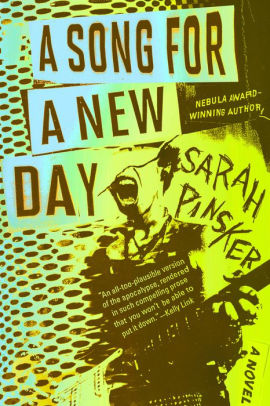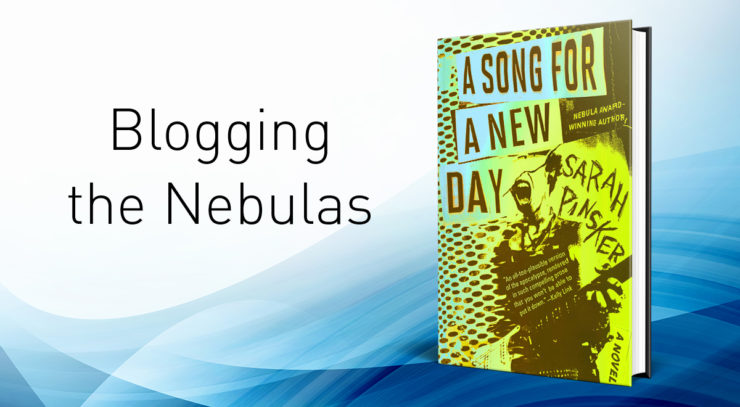The Nebula Awards could be described as the Academy Awards of SFF literature; they are voted on by the professional peers of the award nominees—members of the Science Fiction and Fantasy Writers of America. There are six nominees in the best novel category this year. Every few weeks between now and the announcement of the winner on May 30, I will be reviewing each of them and figuring their odds of taking home the prize. Welcome to Blogging the Nebulas 2020.
The Pitch
Sarah Pinsker’s A Song for a New Day is a different novel today than it was when she dreamed it up (growing from the seed of the 2015 novelette “Our Lady of the Open Road”), different than when it was published last September, than when it was nominated for the Nebula, than when I read it last week (and this review isn’t scheduled to publish until more than a week from when I am writing these words, by which point it will have changed again).
This is the story of a world changed by terrorist attacks and a global pandemic, transformed by laws prohibiting large public gatherings, defined by a culture of permanent social distancing. In timelines split between Before and After, we get a glimpse of how the world was destroyed and the strange place it has been rebuilt into. Reading it as our country faces its own viral threat—and an accompanying existential crisis almost as terrifying, if not as deadly—is a strange experience, filled with dread and unease and no small measure of hope.
It’s also—impossibly, perhaps more so—a story about music: loving it, making it, performing it. In the Before, Luce Cannon is an up-and-coming songwriter with a hit song that has won her a record contract and a nationwide tour, but a shocking terrorist attack on the night of her first show at a large concert hall ends more than her career. Threats of more attacks lead to public gatherings being canceled; a chaser in the form of a killer plague known as “the pox” leads to permanent government-mandated social distancing. Luce turns out to have played the last-ever rock show, a dubious honor that earns her enough viral success (and the resultant royalties) to build a strange new life out of her passion for music.
Buy the Book


A Song for a New Day
A decade later, Rosemary Laws grows up in a brave new world in which much of human interaction has been shunted off to the internet (I mean, even more of it) in the form of “Hoodspace.” Hoodspace is where Rosemary Laws grew up and went to school. It’s where she works, as a customer service rep for a Wal-Mart-meets-Amazon mega-conglomerate that seems at least as powerful as the government, and probably much more so. But then a chance bit of above-and-beyond customer service to the right client lands Rosemary an amazing opportunity: she’s recruited to be a talent scout for Stage Holo Live, which controls seemingly all of what the live music industry has become. SHL signs bands, brings them into the fold, and uses advance recording tech to create a virtual performance experience in Hoodspace that’s nearly indistinguishable from the real thing.
Soon enough, Rosemary finds herself on the road seeking new talent for SHL to mine for revenue—a fraught proposition, considering her sheltered upbringing in a family that shunned both other people and an over-reliance on technology. On a tip from one of the SHL artists, she winds up in a slowly recovering Baltimore, attending nightly shows at an underground music club run by…well, you can probably guess.
Rosemary is wary of saying the wrong thing, unsure whether the musicians she encounters there—vibrant, unique acts risking everything to perform in a world where large gatherings are still illegal—will trust her, or SHL. But she also finds herself drawn in by the music, by the visceral thrill of a live performance, by the sheer power of the sort of communal experience her upbringing denied her.
The story unfolds across two timelines that eventually converge, and through the eyes of both Luce and Rosemary, the former in first-person, the latter in third-person. It’s a story made up of small moments: Luce’s struggles to find a place for herself in the pandemic-stricken world, suffocating without the oxygen provide by stepping out on a stage; Rosemary’s insecurity and self-doubt as she leaves home and steps into a wider world realer than any she ever imagined.
For a story of an apocalypse of sorts, reading it is an almost cozy experience, even now in March 2020. Amid chaos, Luce finds community, finally connecting with roommates she barely tolerated before death came knocking (determined not to let the old world slip away unmourned, they keep a running list of once-everyday activities, positive and negative, that have gone away, entitled “Don’t Forget Normal”). Rosemary’s musical awakening, meanwhile, is communicated in high fidelity: her senses come alive at the thrum of bass in her bones and the pulse of percussion in her veins, making you ache to hear songs that exist only on the page.
There’s not a great deal of conflict in this novel. What there is comes late, and the stakes are kept to a manageable “us against the man” level. The worldbuilding is convincing, and I say that even now that we’re living through at least a portion of it. You’d think its the kind of book you’d never want to read amid the current crisis… I didn’t want it to end.
Why it could win
The case for this novel is strong, on multiple fronts. Leaving aside the merits of the work itself, Sarah Pinsker is clearly a known quantity among Nebula voters. She’s been on the ballot five times already in the shorter fiction categories, winning in 2016 for “Our Lady of the Open Road,” the novelette that became a verse in the story of A Song for a New Day. If first-timers are often at a disadvantage in the Best Novel category (see below), Pinsker would definitely appear to have a good head start with voters.
There’s also the fact that the Nebula voting period happens to have coincided with the coronavirus outbreak, a weird bit of kismet that could win over voters impressed by just how vividly the author has managed to capture what has become our reality. In Rosemary’s venturing into the world for the first time, I witness the anxieties that have already begun to consume my everyday: the closeness of bodies, a grimace at the idea of touching a stranger, horror at the notion of a communal meal. I can’t say how I’d have reacted to this near-future/suddenly present had I read this novel last year; read now, it feels like 2020 between two covers.
Why it may not win
Worthy as any individual work may be, it’s important to remember that the Nebula is ultimately awarded by working writers, and all of them have different reasons for voting their choice. Some will look to the merits of a particular book, while others will examine where it fits into the arc of a career.
For this reason, debut authors are sometimes at a disadvantage—even those who have been previously nominated for shorter works. Though the Nebula has certainly gone to a first-timer on occasion (notably, William Gibson’s Neuromancer, and more recently, Ann Leckie’s Ancillary Justice and Charlie Jane Anders’ All the Birds in the Sky), writers with a longer bibliography tend to face better odds.
As a novel, A Song for a New Day is also heavy on character and convincing worldbuilding but a bit short on plot; the story is mostly concerned with the interior growth of its two protagonists and there isn’t much in the way of conflict (aside from, you know, the whole world falling apart at the beginning, there). While I personally think this works—the world is fascinating and the characters are wonderful to spend time with—it might not work for all readers…and voters.
Whether it wins the Nebula or not—and how appropriate a winner would it be in 2020, considering the ceremony is likely to take place entirely online, experienced via the shared virtual reality of the internet—A Song for a New Day seems destined to be remembered for years to come, if only because Sarah Pinsker imagined an apocalyptic scenario and managed to get so many of the details exactly right.
Joel Cunningham was the founding editor of the B&N Sci-Fi & Fantasy Blog (RIP), where he explored the galaxy for 5 years, picking up a Hugo Award (well, tangentially) along the way. He’s now managing editor of Lifehacker, which means he’s managing at least one thing nowadays. He lives in an apartment in Brooklyn with his wife and two children and hopes to go outside again someday. He tweets @joelevard.










